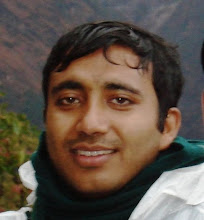While watching Blood Diamond, which is about global forces running Diamond Industry in African backyard and their effect on Diamond trade, I couldn't stop myself from relating how SURAT (and hence India) is an important link in this bloody chain. All of us have heard about sierra-leone and liberia and such other places facing rebellion. Ever wondered how much of this is INTERNAL (and about tribal group fighting the one-up-manship games and aboutattempts to control boundaries) and how much of is EXTERNAL (and about maintaining links for continued trade with outside world even if it means applying illegal means and killing lakhs of innocent people). The film defines what conflict-diamond means, how it represents the ugly face of human race, of colonialism and how macro business interests destroy existence of communities at micro level.
Leonardo Di Caprio has shown tremendous maturity in designing progress of his film career by selecting meaningful roles throughout since Titanic (1996). He is superb again as the Diamond mediator-cum-smuggler who had a troubled life so far and seems to have lost ability to be humane. There is a lady journalist who starts by pursuing him for story (on blood diamond). She so beautifully and subtely falls in love with the smuggler that audience is left with just the emotion and not the fact (that she loved him, and which was reciprocated) when the film comes to an end. Haven't seen many hollywood movies being so expressive without being displayful.
Blood diamond is story of Solomon, the african fisherman who loses touch with his family when diamond rebels attack his village and makes him a captive labour in diamond-mines. He is pursued and later helped by Diamond racketeer (colonel and his mark-man, played to perfection by leonardo) in search of a diamond stone which Solomon had hidden during his work at mines. Everyone is after it beacause it is perhaps the biggest diamond till date. The journalist helps Solomon in his search for his family. Among many twists and turns, there are issues of human tragedy, migration, peace forces, food programs, refugee camps, human emotions, upbringing, greed, faith, love, betrayal, fear, good, evil, economics and power; all of this interwoven in a storyline which is pacy, activity driven, in-the-face, and comprehensive.
When the viewer comes out of the theatres, no doubt is left about what will they ask the next time they go to buy a diamond ring or necklace. "Please tell me/ certify that this piece of diamond doesn't come from a conflict zone". If the film does that on a sustained basis, it would have done much more than what other mediums of advocacy could. A film that I will place alongwith Syriana, a film on Oil Diplomacy which has taken equally nasty and bloody turns in last four decades of our present day world.
So I'm Writing a Thing Part 4- The Library
3 years ago
